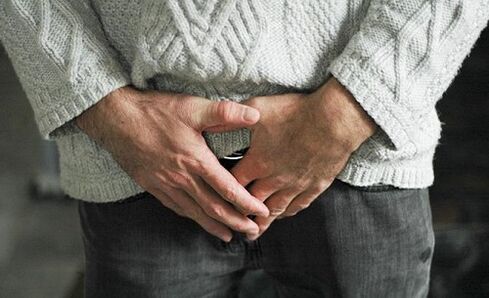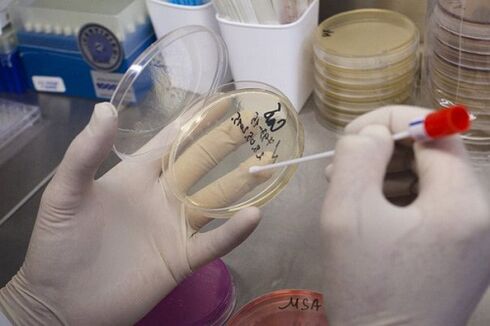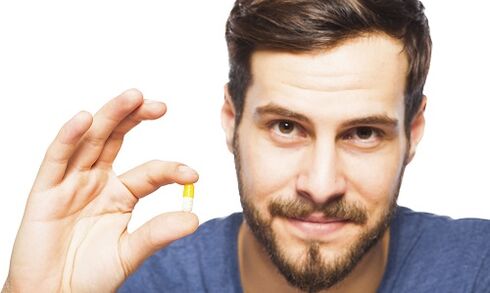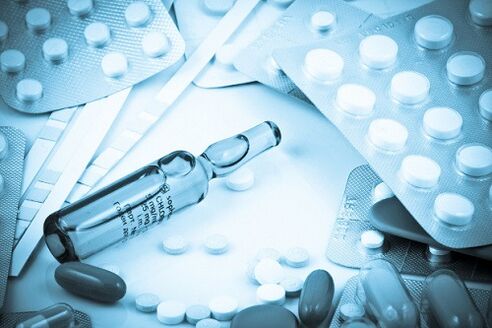The male genitourinary system is prone to the development of inflammatory processes associated with exposure of the tissues of the organs of pathogenic microflora. Hygiene, unprotected sex, poor immunity, lack of regular physical activity - all these factors contribute to the development of stagnation and inflammation in the prostate gland.

Symptoms of acute prostatitis are the basis for emergency medical care, and the chronic form of the disease requires constant monitoring.
Treatment of various forms of prostatitis
To date, doctors use certain treatment regimens for inflammatory prostate disease. The choice of medication depends mainly on the form of prostatitis and the severity of its symptoms.
In acute inflammation, fast-acting drugs with antibacterial properties are indicated.
The doctor should prescribe treatment after examination and determination of the type of microorganisms that cause the development of prostatitis. Sometimes, with acute symptoms, antibacterial drugs are prescribed immediately upon contact with the patient. In the future, after receiving the results of laboratory tests, the urologist may prescribe another drug for prostatitis.

These are the results of the basic microbiological culture for the appointment of one or another type of antibiotic.
If the acute form of the disease is treated relatively quickly, therapy with chronic prostatitis can last up to six months. The doctor will usually prescribe a number of medications to be taken according to a regimen. It should be remembered that in a chronic disease, the prostate gland can become inflamed several times, so patients should consult a doctor regularly and undergo a course of treatment after the second examination.
Preparations for the treatment of prostatitis are selected depending on the severity of the symptoms of the disease and its causes. Inflammation should be treated with medications aimed at reducing the symptoms, usually manifested by problems with urination, pain syndrome, and deteriorating quality of sex life. If the medication for prostatitis is chosen correctly, the patient will notice discomfort in the pelvis and a decrease in the volume of discharge from the urethra, and normalization of urine flow after a week.

The rapid movement of the product does not guarantee its best effectiveness.
Many drugs for prostatitis reduce the symptoms of the disease in a fairly short time, so patients consider them the most effective. In fact, this is not entirely true, because not all drugs can cure the disease.
The drug prescribed for prostatitis should be selected after identifying the provoking factors.
Carrying out antibiotic therapy
Before using a drug for prostatitis with antibacterial properties, the patient should undergo not only an external examination, but also an examination of the blood, sperm, urine, bacterioscopy of a smear from the urethra. The results of the analysis allow the urologist to accurately determine the choice of antibacterial drug. If several types of microbes are detected at the same time, the prescribed course should consist of two or more drugs.

When two antibiotics are prescribed, they can be administered in different ways, such as injections and tablets.
Antibiotic therapy is mandatory with acute prostatitis. Antibiotics are indicated to prevent infection with mild symptoms of the disease. The urologist decides which medications the patient should take after receiving a transcript of the tests.
The modern approach to the treatment of acute inflammatory bowel disease involves the use of antibiotics for a week and a half. The scheme for the treatment of chronic form is designed for a longer period - about two months.
A drug containing levofloxacin eliminates inflammation well. This substance is able to quickly accumulate in the affected tissues and destroy streptococci and staphylococci. The drug is very effective, but can cause side effects in the digestive tract and part of the cardiovascular system.

Before starting treatment with the drug, you should carefully study the side effects described in the annotation and the rules of taking the tablets.
The tablet should be taken only after meals, otherwise irritation of the gastric and intestinal mucosa may occur. For prostatitis, it is better to consult a doctor if this drug causes a significant deterioration in well-being.
In chronic inflammation of the prostate, a drug that acts on various types of pathogens has a good effect.
Serious disorders of the gastrointestinal tract, including the liver, may appear in the background of medication, so doctors recommend completing the course of treatment with hepatoprotectants. In case of adverse reactions of the body, the urologist changes the scheme of treatment of prostatitis in men and selects drugs depending on the existing pathology.
The drug belonging to the group of macrolides is effective against the simplest microorganisms - mycoplasma, ureaplasma, chlamydia.
When chlamydia and mycoplasmosis are detected, drugs containing a number of macrolides and cephalosporins are used. The use of the penicillin group is also justified in the treatment of prostate disease.
Anti-inflammatory drugs
After the examination, the doctor decides which anti-inflammatory drug to prescribe to the patient. The active components of the funds help to restore the urinary process and reduce pain.
You should ask your doctor which medications relieve pain and swelling. In chronic inflammation, a drug that increases the blood supply to the gland, prevents thrombosis, eliminates swelling and improves the urinary process is now used with great success. The main component of the remedy is a dried bovine prostate. It helps to increase potency, normalize microcirculation in the genitals and reduce the symptoms of inflammation. Many new drugs developed to treat prostatitis contain this animal component with proven effectiveness by urologists.
As an auxiliary component, the drug contains zinc, the most important trace element for the male body, which often helps to restore the reduced potential in chronic prostatitis. Candles can be used for hemorrhoids and damage to the intestinal mucosa.
Drugs with analgesic effect
The pain that occurs during the exacerbation of the disease helps to remove drugs that have an analgesic effect.
NSAIDs have a good effect, penetrate the prostate gland quickly and have an analgesic effect.
In inflammatory processes accompanied by serious problems with urination, urologists prescribe muscle relaxants that help relax the muscle tissue of the prostate gland and bladder and restore urination. The drug is also used for hypertension, which is prone to low blood pressure and prone to liver damage, is contraindicated.
Folk ways
Doctors do not deny the effectiveness of folk recipes in the treatment of prostatitis. Various decoctions can be used to reduce inflammation and relieve pain. With heaviness and discomfort in the pelvis, chamomile, St. John's wort, thyme are used. It is useful to add honey to the prepared medicinal drinks.
You can make therapeutic enemas and baths from decoctions of the same plants. It is useful to add 5-8 drops of lavender or tea tree essential oil to the water collected in the bowl before the procedure. Sometimes doctors recommend taking a concentrated bath with needles. Hypothermia should not be tolerated with prostatitis, so it is advisable to add warm water to the bath as it cools. The average duration of the bath is 20 minutes.
When signs of prostatitis appear, you can buy candles containing honey and propolis.
These products are very useful because they have a clear antiseptic effect. Some men make their own suppositories using wax and honey.
Various tinctures also have beneficial effects. They are made from herbs, aspen bark, propolis. Remember that natural substances can cause an allergic reaction. If a man is hypersensitive to herbs, this treatment should not be used. Honey is also very allergenic and should not be used if you are allergic to other bee products. If such reactions of the body are not observed, two or three tablespoons of honey can be eaten every day.

Doctors recommend massaging the prostate to remove the blockage. This procedure is performed with a finger or a special device whose value directly depends on the number of functions inserted into the rectum. The device can be equipped with a vibration mechanism. Such an effect is useful for swelling and stagnation of prostate secretion in the gland. Any medical procedures should be performed only after a thorough examination and consultation with a urologist.



























